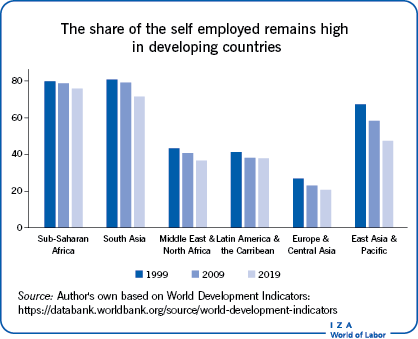Relevanz des Themas
Can entrepreneurship programs be successful labor market policies for the poor? A large share of workers in developing countries are self-employed (mostly own-account workers without paid employees, often interchangeably used as micro entrepreneurs). Their share among all workers has not changed much over the past two decades in the developing world. Entrepreneurship programs provide access to finance (or assets) and advisory and networking services as well as business training with the aim of boosting workers’ earnings and reducing poverty. Programs vary in design, which can affect their impact on outcomes. Recent studies have identified some promising approaches that are yielding positive results, such as combining training and financial support.

Wichtige Resultate
Pro
Self-employment continues to be a major source of employment and earnings in developing countries, and enhancing the productivity of the self-employed is important for poverty reduction.
Entrepreneurship programs aim to raise micro entrepreneurs’ productivity by addressing key constraints.
Combining business training and financing along with supplemental services seems more effective than stand-alone programs in promoting labor market activities among poor self-employed workers.
Providing support customized to the needs of participants improves program effectiveness.
Contra
Entrepreneurship programs for the poor often show impacts that are small and not statistically significant, and the programs’ longer-term sustainability is unclear.
Improved business practice or knowledge does not automatically lead to business growth or job creation.
Little information is available on the details of implementation quality and cost of the intervention, making comparing programs difficult.